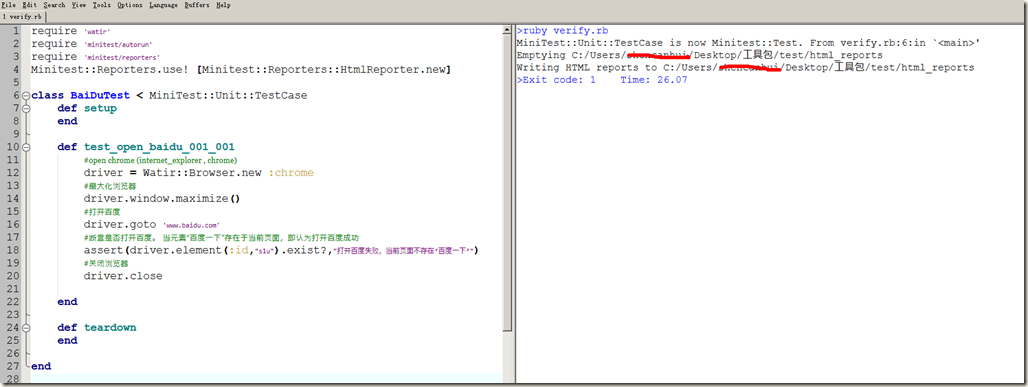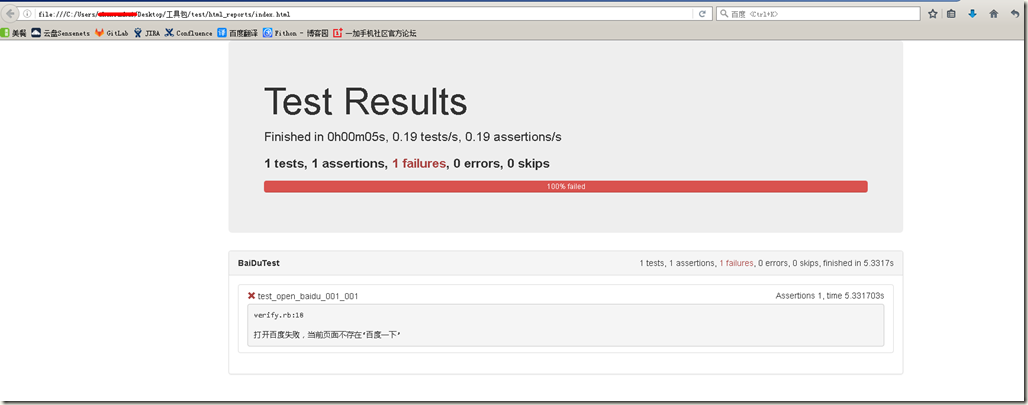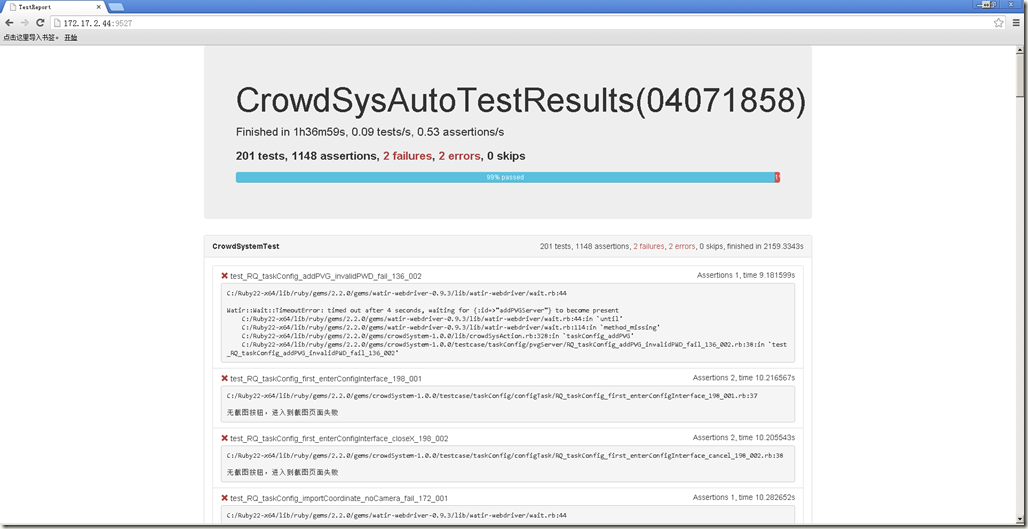web自动化测试:watir+minitest(五)
测试报告:
加载minitest-reporters库,并设置相关的参数。既可以在每次运行测试后生成响应的测试报告。
默认会生成一份html的报告在当前目录的test目录下
我们可以指定参数对报告的标题、报告存放目录、html的文件名进行设置。
#测试报告标题
$testReportTitle = "CrowdSysAutoTestResults(#{Time.now.strftime("%m%d%H%M")})"
#测试报告目录
$testReportDir = 'C:\AutoTest\rails\testReport\app\views\reports'
Minitest::Reporters.use! [Minitest::Reporters::HtmlReporter.new(:title => $testReportTitle,:reports_dir => $testReportDir,:output_filename => 'index_new.html')]
- 搭建web服务器提供报告给公司所有人访问
既然是使用ruby做的自动化,我们搭建一个简单的rails即可。搭建过程略。请参考(http://guides.ruby-china.org/getting_started.html)
rails搭建正常运行起来后。
我们将测试报告的生成目录设置为rails的:\app\views\reports
然后所有人就可以通过rails的服务端口来访问测试报告了
- 邮件推送
测试完成后,自动发送邮件将测试结果推送给相关人。相关代码片段:
############## 开始发送邮件 ######### ##获取执行结果数据 File.readlines($testReportDir+'\index.html').each{ |line| $testCaseNum = line.force_encoding('utf-8').scan(/\d+\s*tests/) if line.force_encoding('utf-8')=~/span class=".*">\d+\s*tests/ $assertionsNum = line.force_encoding('utf-8').scan(/\d+\s*assertions/) if line.force_encoding('utf-8')=~/span class=".*">\s*\d+\sassertions/ $failuresNum = line.force_encoding('utf-8').scan(/\d+\s*failures/) if line.force_encoding('utf-8')=~/span class=".*">\s*\d+\s*failures/ $errorsNum = line.force_encoding('utf-8').scan(/\d+\s*errors/) if line.force_encoding('utf-8')=~/span class=".*">\s*\d+\s*errors/ $skipsNum = line.force_encoding('utf-8').scan(/\d+\s*skips/) if line.force_encoding('utf-8')=~/span class=".*">\s*\d+\s*skips/ $finishTime = line.force_encoding('utf-8').scan(/finished in .+?s/).to_s.sub('["','').sub('"]','') if line.force_encoding('utf-8')=~/finished in/ } $pwd = Pathname.new(__FILE__).realpath.dirname File.readlines("#{$pwd}/startTest.ini").each{ |line| @username = line.sub(/.+\s*=\s*/,'').chomp if line=~/username\s*=/ @passwd = line.sub(/.+\s*=\s*/,'').chomp if line=~/passwd\s*=/ @smtpaddress = line.sub(/.+\s*=\s*/,'').chomp if line=~/smtpaddress\s*=/ @port = line.sub(/.+\s*=\s*/,'').chomp if line=~/port\s*=/ @domain = line.sub(/.+\s*=\s*/,'').chomp if line=~/domain\s*=/ $from = line.sub(/.+\s*=\s*/,'').chomp if line=~/from\s*=/ $to = line.sub(/.+\s*=\s*/,'').chomp if line=~/to\s*=/ } smtp = { :address => @smtpaddress, :port => @port, :domain => @domain, :user_name => @username, :password => @passwd, :enable_starttls_auto => true, :openssl_verify_mode => 'none' } Mail.defaults { delivery_method :smtp, smtp } mail = Mail.new do from $from to $to subject "【#{$crowdSysVersionNum}】Crowd System AutomationTest Reports #{curr_time}." body "\n\nAutomation test #{$finishTime}.\n\n\n\n#{$testCaseNum},#{$assertionsNum},#{$failuresNum},#{$errorsNum},#{$skipsNum}\n\n\n\nDetail reports: http://172.17.2.44:9527/reports/index\n\n\n\nSystem under test: #{$crowdSysURL}" end mail.deliver!
邮件效果图:







 浙公网安备 33010602011771号
浙公网安备 33010602011771号